|
|
| |
|
|
■
『世界の英語教室 (小学校)』
「番外編・ブータンの教科書」
"English textbook for elementary school students in Bhutan"
By Mina Hisada/Illustration by Puri
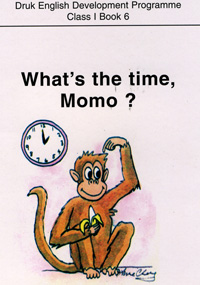
|
(お猿さんが表紙・
小学校1年生用の教科書)
|
何か面白い本を読みたい? じゃあ、英語を読めるようになろう。知識を身に付けたい?じゃあ、英語を覚えよう。知的好奇心を満たすには英語が必要とされる国、ブータン。ブータンの事情を探るほど、英語を使う必要性があるからこそ、語学が上達するのだということを実感させられます。今回は、そんなブータンの子供たちが使っている教科書をご紹介します。
Looking for some interesting books? Need to study English? Want to learn something? Well, you need to read in English. In Bhutan, fulfilling an intellectual curiosity means you need to know English. It's often said that foreign languages are only mastered through necessity. It's true. Just look at the kids in Bhutan. So, let's have a closer look at some of their English textbooks this week.
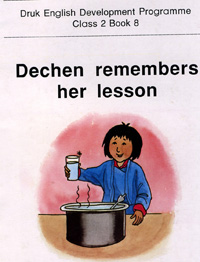
|
|
(小学校2年生用の教科書)
|
小学一年生の教科書は「今何時?」など、数や簡単な言い回しを習う程度。「モモ」というお猿さんが登場し、一緒に勉強します。その後、自己紹介や比較級を習い、高学年にもなると点字や地震の起こる仕組みなどを学習します。その内容は、「これは英語の教科書ではなく、ほかの教科の教科書ではないか?」と疑ってしまうほど多岐にわたっています。
In Grade One, they study how to count with monkey called Momo. They learn how to say "What time is it?" After that, they learn how to introduce themselves and how to compare things. At a higher level, they even study a variety of topics, such as about Braille or earthquakes. There are so many different topics and it's amazing to find some of them in an English textbook and not a textbook for other subjects.
◆パート1 ( Part 1)
まずは、
1月のブータン特集でご紹介したお話の「続き」から始めます。
ではその教科書を見てみましょう。
ブータンで寮生活をしている男の子がホームシックになり、寮を抜け出すお話でしたね。
First of all, we will have a look at the story featured on this site in January about the boy who lives in a dormitory and tries to get out.
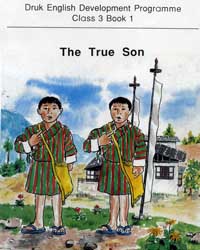
(教科書のカバー)
|

(寮生活をしている男の子は、
ホームシックになってしまいます。)
(A boy in a dormitory becomes
homesick. )
|
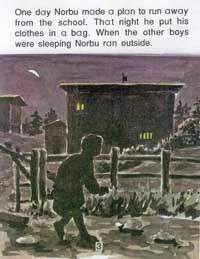
(ある晩、こっそり抜け出します。 )
(One night, he decided to run away.)
|
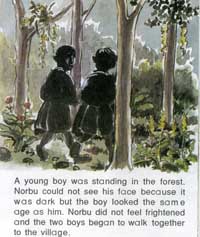
(林の中で、一人の男の子と出会います。)
(He meets a boy in the forest, but it's dark so he can't see his face.)
|
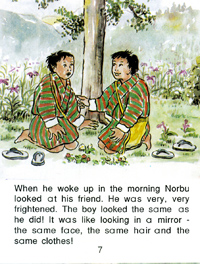
(起きてみたら、あらびっくり。
相手は自分にそっくりでした。)
(The next morning, he is surprised
to find that the boy looks exactly like himself.)
|
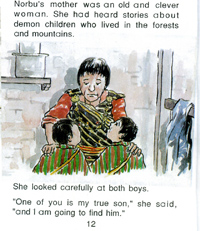
(やっと会えたのに、お母さんはどちらが本物か分かりません。)
(So when he meets his mother, she can't tell which is her true son.)
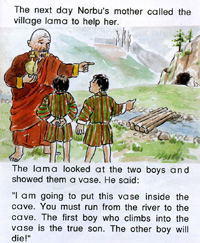
(そこでどうしたらよいか、お坊さんに
相談しました。
お坊さんは言います。
「あのほら穴の
中に大きな花瓶を入れよう。花瓶の上
まで一番早く登った方が本物だよ」
)
(They consult a monk. He says, "I will
put this vase inside the cave. Whoever reaches the vase first and climbs onto
the top is the true son." )
|
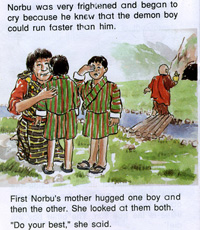
(本物の方の男の子は泣き出します。
なぜなら勝つ自信がなかったから。
お母さんは二人を励ましました。)
(The boy begins to cry. He doesn't
think he will win. His mother tries to cheer both of them up.)
|
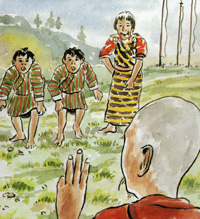
(さぁ、勝負の始まりです。お坊さんは合図をします。「いち、にの、さん!」)
(And so the race starts. The monk says, "Ready, set, go.")
|
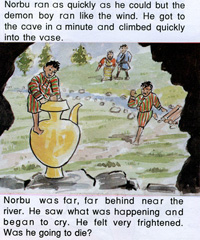
(にせものの男の子は、すばやく走り、
すぐに花瓶に登りました。
本物はまたしても泣き出してしまいます。)
(The other boy quickly runs to the vase and climbs on top. The true son begins to cry again.)
|

(しかし、ひと足先にほら穴に入って
いたお坊さんは、われ先にと花瓶に
登ったにせものをつかまえ、花瓶の
中に閉じ込めてしまいます。)
(But the monk, who is already inside
the cave, catches the false son as he climbs up the vase and puts him inside.)
|
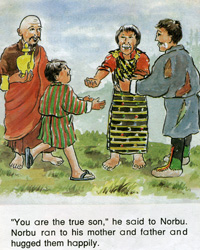
(「本物はお前だったんだね!」とお母さんは言い、お父さんと三人で抱き合いました。めでたし、めでたし。)
("Oh, you are my son!" says the mother, and he hugs his parents. The End.)
|
|
◆
パート2 ( Part 2)
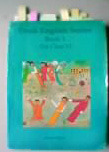
|
(付せんでいっぱい
になった教科書)
|
ブータンの英語の教科書について、編集者のベンさんと話してみました。
I talked with Ben, an editor, about the Bhutanese English textbook.
☆ベンさんには面白そうなところに付せんを張っておいてとあらかじめ頼んでありました。
I asked him to mark anything he found in the textbooks that he thought was interesting.
筆者:
どうだった?わー、すごい付せん!
How was it? So many post-its!
|
|
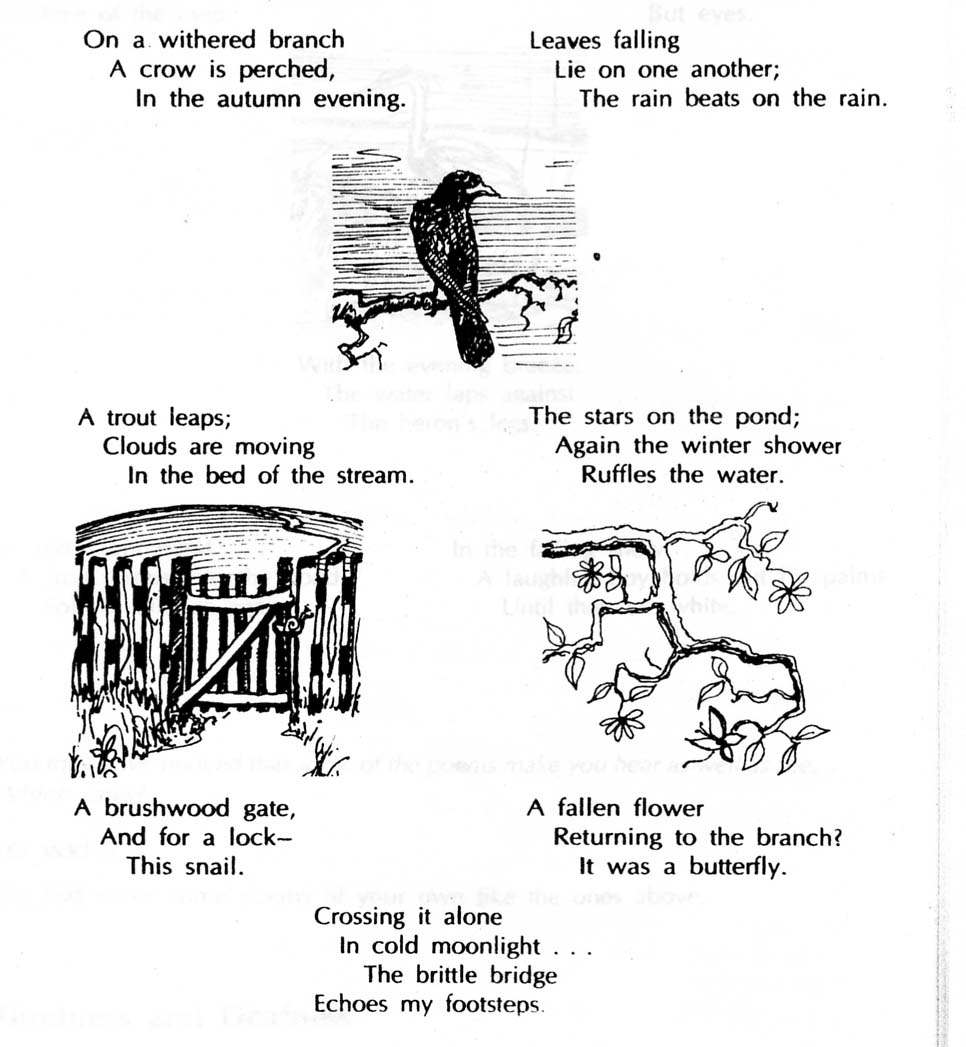
|
(俳句が紹介されています)
(Click here!)
|
BEN:
面白かったよ。それにしても、言葉を覚えるのにこんなに詩が入っている教科書も珍しいね。
It was fun. And you don't see many textbooks that include so much poetry .
筆者:どれどれ?あー、ほんと。ここなんか「芭蕉」も紹介されているんだね。
"A small hungry child Told to grind rice, Instead Gazes on Moonlight"だって。
Let's see. That's true! Even the Japanese poet Basho appears here — "A small hungry child told to grind rice instead gazes on moonlight."
|
|
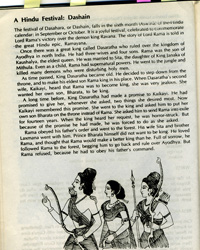
|
(こちらはインドのお話)
(Click here!)
|
BEN:あと、いろいろな国の話が載っているよね。インドとか中国とかイギリスとか…。
And there are all sorts of stories from around the world, from India, China, the U.K. ...
筆者 :ほんとだ。でも、自分の国のこともしっかり紹介しているのがいいね。 「ツェチュ」のお祭り(※)のこととか…。これなんかも面白いね。ブータンで家を建てるときの決まりが書いてあるの。
Right. But there are also articles about their own country, ※"Tshechu" for instance.
Oh, this is nice. It's about the rules of how to build a house in Bhutan.
|
| |

|
(ツェチュの登場人物)
(Click here!)
|
※「ツェチュ」と呼ばれるお祭りは一年のうちでも大きな国民的イベントの一つです。
ブータンに仏教を伝えた『パドマ・サンバヴァ』の偉業をたたえるお祭りです。
Tshechu is the biggest festival on the Bhutanese calendar.
It's held in honor of Rijpoche Padmasanbhava, who brought Buddhism to Bhutan.
BEN: 取り上げられている内容が幅広いよね。キリスト教と仏教を比較して共通点を探す課題があるかと思えば、やけどをしたときの対処法なんかもあるよ。
There's a huge variety of topics here - here you're asked to compare Christianity and Buddhism, here you're told about how to cure burns.
|
| |
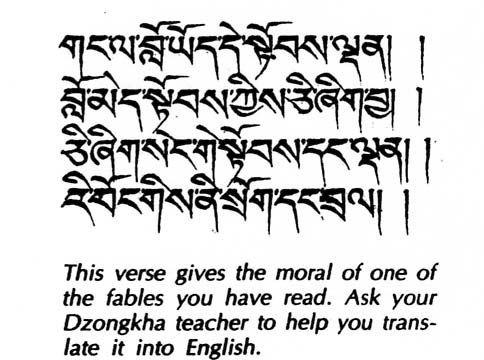
|
(これが母国語・ゾンカ語。
英語に訳してみよう
という課題です。)
(Click here!)
|
筆者:へー。それは気が付かなかった。私はこれが気に入ったなぁ。点字の紹介と、地震について。あと、数はどのようにして出来たか、というお話。
I didn't notice that. My favorite one is this — braille, earthquakes, and how the numbers were invented.
BEN :僕のイチ押しはこれ。※" I am my own grandpa." ! "I am my own grandpa." My favorite one is this!"
※"I am my own grandpa" のお話とは…:
「僕」はある未亡人と結婚した。
しばらくして僕の奥さんに僕のお父さんが恋をする。そのうち彼ら(僕の奥さんと僕のお父さん)は結婚してしまう。お父さんは僕の「義理の息子」になり、お父さんの奥さん(僕の母親)は僕の「娘」になり…そこから続く血縁関係をたどっていくと…気付いたら僕は「僕のおじいちゃん」になっていた!
I was married to a widow and my father fell in love with her and soon they too were wed. This made my dad my son-in law. My daughter was my mother because she was my father's wife. When I realize, I became that I am my own grandpa.
|
|
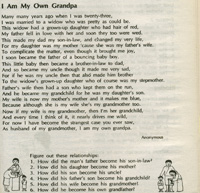 |
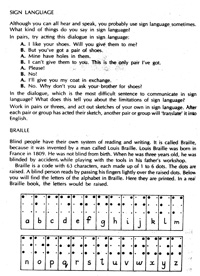 |
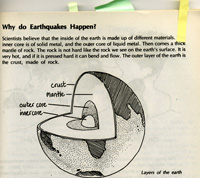 |
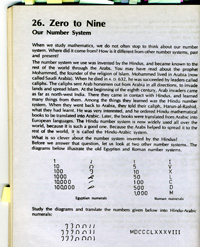 |
I am my Own Grandpa
(Click here!)
|
点字について
(Click here!) |
地震が起こる仕組みについて
(Click here!) |
数はどのようにして出来上がったのか
(Click here!)
|
ブータン英語教室はこちら
|
|
|
| |
